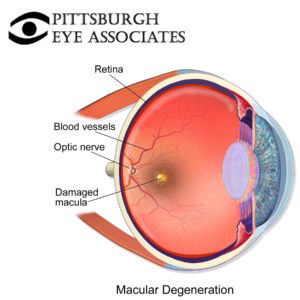Macular degeneration (AMD) is an aging disease in the central area of the retina, the macula. There are two forms; Nonexudative (dry) and exudative (wet).
Non Exudative (Dry) Macular Degeneration
Symptom is usually a gradual decrease in vision.
Result of tissue atrophy and deposits (drusen).
Treatments include AREDS multivitamins, fish oil or other omega-3 supplements, UVA and UVB protective lenses and sunglasses.
Exudative (Wet) Macular Degeneration
Vision loss is sudden and rapid, some patients notice a blind spot in their central vision.
This form of the disease is characterized by abnormal bleeding and blood vessel formation in the retina.
First line treatment for wet macular degeneration is injections of Avastin into the eye to stop bleeding and blood vessel formation.
Pittsburgh Eye Associates recommends that all macular degeneration patients supplement their diet with Macular Protect Complete AREDS Vitamins and Super Omega-3. Both of these vitamins should be taken with food to improve absorption and therefore bio-availability. All of these are available at Pittsburgh Eye Associates.
Macular Protect Complete
In a study sponsored by the National Eye Institute, it was found that treatment with the AREDS formula, a combination of vitamins and minerals including zinc, copper, vitamins C, E, and beta-carotene, can help preserve eyesight in those with wet or dry macular degeneration by slowing the progression. Macular Protect Complete combines the ingredients beneficial to macular health and other essential nutrients and antioxidants to make a complete multivitamin to promote whole body health.
A modified formula is recommended for patients who have recently quit or are currently still smoking.
Super Omega-3 EPA/DHA with Sesame Lignans & Olive Fruit Extract
Omega-3 fatty acids are proven to be beneficial for overall health, easing the effects of inflammation. Apparently there is an inflammatory component to Macular Degeneration since these products have been proven to aid in slowing down the disease process.
This particular formula is molecularly distilled, ensuring that any possible pollutants have been removed. The infusion of sesame lignans ensures that the fatty acids retain their nutritional value while targeting inflammatory reactions. Olive fruit extract in combination with the fish oil helps in the reduction of inflammation more than just fish oil alone. So this formulation optimizes the anti-inflammatory effect of the Omega 3 Fatty Acids.
Interestingly, Super Omega-3 can also provide some relief for patients who experience dry eyes, as well as aiding in pain relief for those with arthritis or other inflammatory conditions.
Foods beneficial in minimizing risk of Macular Degeneration
Oranges and bananas have been shown to be protective in Macular Degeneration! So we recommend that anyone concerned with this potentially devastating eye disease, should add these to their daily diet. In general, fruits and vegetables provide anti-oxidants that can be protective. So load up on these and minimize processed and fried foods for overall better health!
Prevent Macular Degeneration
An April 2011 report in Archives of Ophthalmology found that people with a healthy lifestyle had a threefold reduction in the risk of age related macular degeneration. Regular exercise had the strongest correlation with lower risk of macular degeneration. The other 2 major factors are eating a healthy diet and smoking. Patients in this study with healthy scores in all 3 components were found to have a 71% decreased risk of macular degeneration. These patients had never smoked, exercised 8-10 hours per week, and ate a diet low in fat but high in whole grains, fruits, vegetables, and protein. The healthy lifestyle is believed to lower oxidative stress, inflammation in the body, and blood pressure.
From Investigative Ophthalmology & Visual Science:
Influence of Lutein Supplementation on Macular Pigment Optical Density and Vision in Macular degeneration Patients
Authors of the Lutein Intervention Study Austria (LISA) study hypothesized that lutein supplementation increases macular pigment optical density. They examined whether lutein supplementation improves visual acuity and macular function as assessed with microperimetry.
They included 126 patients with age-related macular degeneration administered lutein or placebo for 6 months. The authors measured macular pigment optical density. Lutein significantly increased macular pigment optical density by 27.9 ± 2.9% versus placebo, the authors reported. The study authors found a significant correlation between the increase in macular pigment optical density after 6 months and the increase in vision after 6 months.
To conclude, the LISA study demonstrates that lutein supplementation increases macular pigment optical density as assessed with an objective method. The correlation between the change in macular pigment optical density and the change in vision indicates that patients who show a pronounced increase in macular pigment optical density also benefit in terms of visual function.
SOURCE: Weigert G, Kaya S, Pemp B, et al. Effects of lutein supplementation on macular pigment optical density and visualacuity in patients with age-related macular degeneration. Invest Ophthalmol Vis Sci. 2011; Aug 27 [Epub ahead of print].

